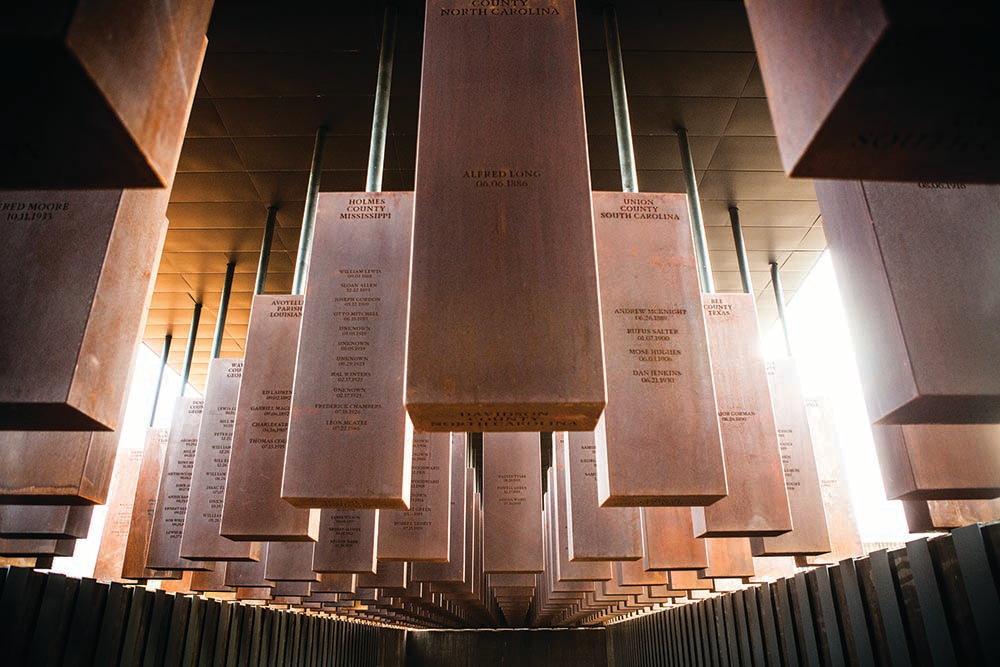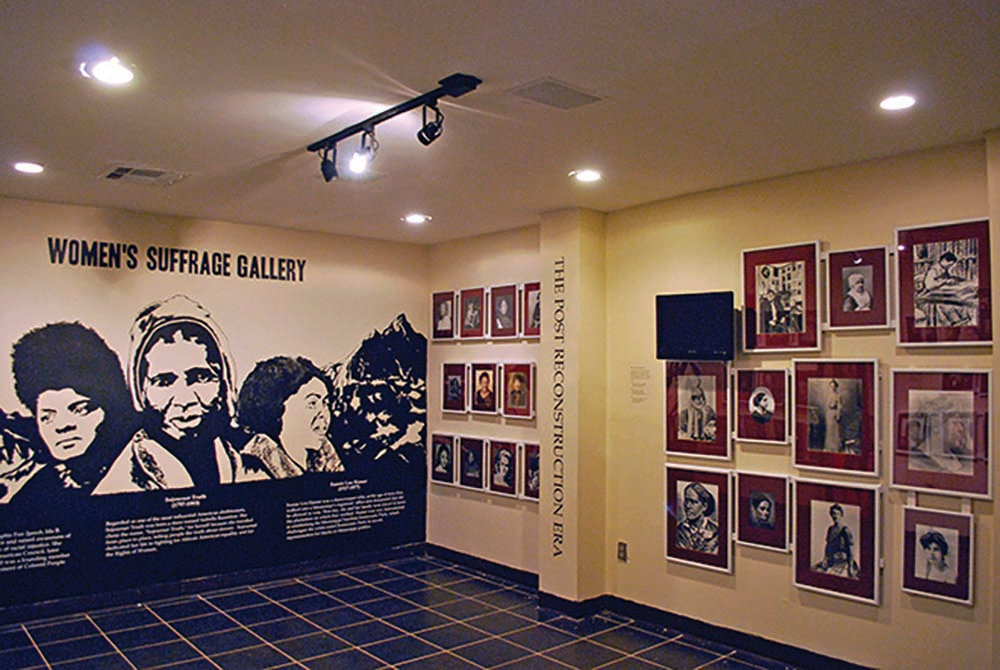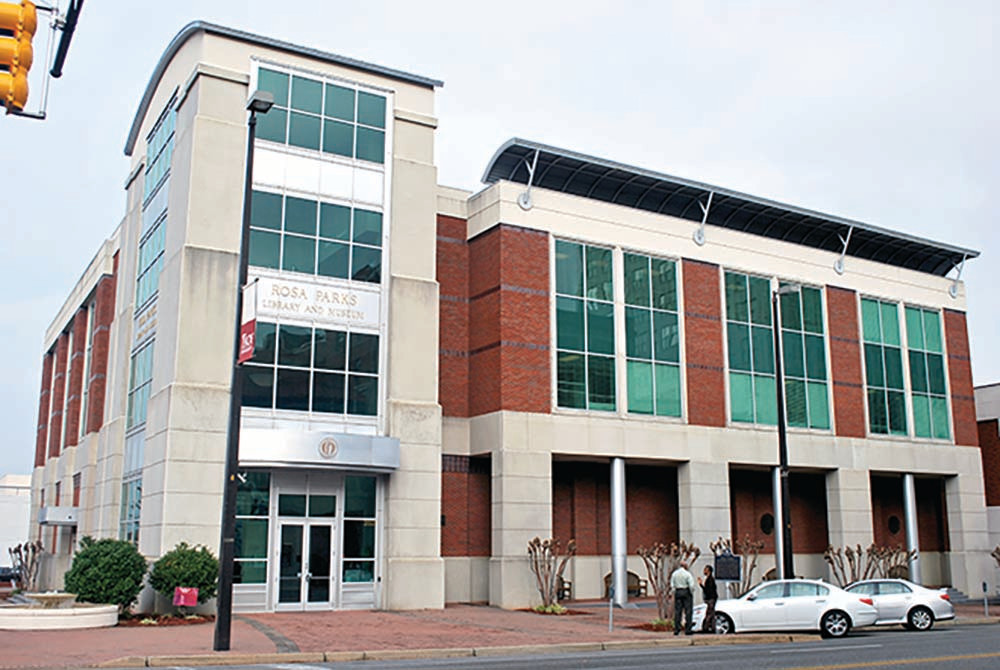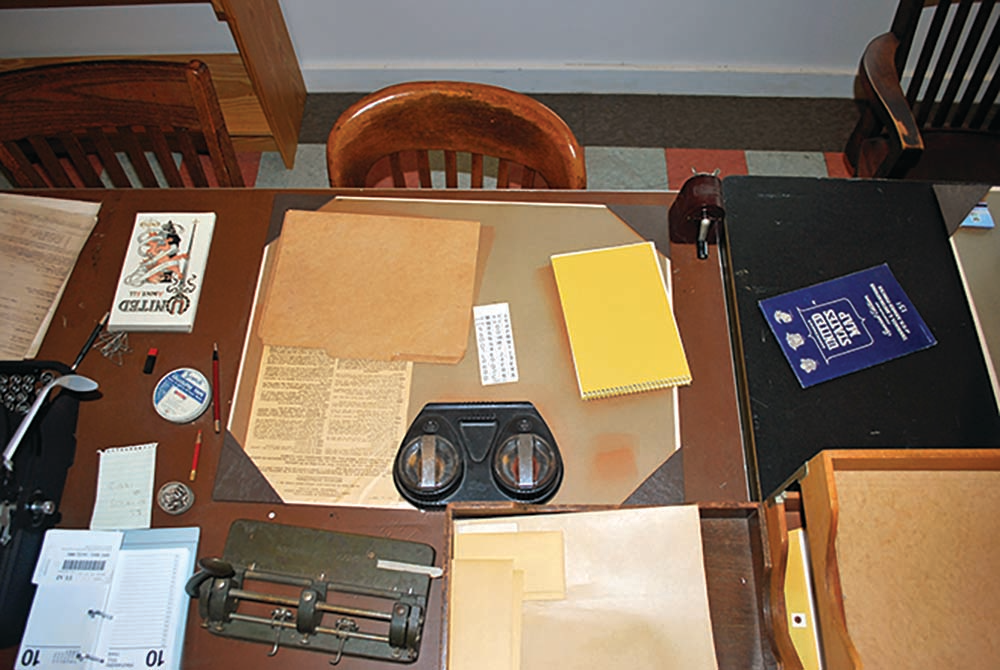We are not makers of history, we are made by history.
– Dr. Martin Luther King, Jr.

By Marilyn Jones | Photos by Marilyn Jones except where noted
“With February designated as Black History Month, Alabamians have the unique opportunity to visit many important civil rights sites that are just a short drive away, or maybe just around the corner,” says Dorothy Walker, site director of the Freedom Rides Museum. “Come experience this history as you walk in the footsteps of the foot soldiers – and visit the unique sites where history took shape.”
Throughout Alabama are museums and memorials honoring the accomplishments and struggles of African Americans. Here is a sampling of sites illustrating this important part of Alabama and national history.
National Memorial for Peace and Justice and The Legacy Museum, Montgomery
Chronicling the dark history of the slave trade, racial terrorism, the Jim Crow South and the world’s largest prison system, the Legacy Museum helps investigate America’s history of racial injustice. The nearby memorial pays tribute to the more than 4,400 African American men, women and children who were murdered by white mobs between 1877 and 1950. It is the first of its kind to acknowledge the victims of racial terror lynching.
For more information: museumandmemorial.eji.org; (334) 386-9100.
Negro Southern League Museum, Birmingham
The museum tells the story of African-American baseball in America through the eyes of Birmingham. The museum features the largest collection of original Negro League baseball artifacts in the country and features a Negro League and Southern League baseball history research center.
For more information: birminghamnslm.org; (205) 581-3040.
Birmingham Civil Rights Institute, Birmingham
Educating and enlightening each generation about civil and human rights is the underlying principle of the institute. Part of the Birmingham Civil Rights National Monument and an affiliate of the Smithsonian Institution, it helps further the understanding for the significance of civil rights developments in Birmingham.
For more information: bcri.org; (866) 328-9696.
 National Voting Rights Museum, Selma
National Voting Rights Museum, Selma
The museum addresses the contemporary struggle for voting rights and human dignity. Exhibits help explain events such as the struggle leading up to the Selma to Montgomery March and the civil rights movement throughout the South.
For more information: nvrmi.com; (334) 526-4340.
Freedom Rides Museum, Montgomery
In 1961 volunteers made history by challenging the practice of segregated travel through the South. They called themselves Freedom Riders as they crossed racial barriers in depots and onboard buses. The museum tells the story of the non-violent protest that helped end racial segregation in public transportation.
For more information: ahc.alabama.gov/properties/freedomrides; (334) 242-3184.
 Rosa Parks Library and Museum, Montgomery
Rosa Parks Library and Museum, Montgomery
The museum chronicles Rosa Parks and her refusal to give up her bus seat to a white passenger in 1955. When she refused she was arrested. This led to the bus boycott, which eventually led to changes in the law. Exhibits detail the setbacks and ultimate success of the boycott.
For more information: visitingmontgomery.com; (334) 241-8615.
Selma to Montgomery National Historic Trail
Until 1965, some counties in Alabama used measures to prevent African Americans from registering to vote. Protests against this injustice were met with violence including death. On March 25 nearly 25,000 people began to walk from Selma to Montgomery. Five months later, President Lyndon B. Johnson signed the Voting Rights Act, which prohibits discrimination in voting practices or procedures because of race and color.
The Selma Interpretive Center and the Lowndes Interpretive Center, located along the original march route on U.S. Highway 80 in White Hall, both offer insight into the struggle. There are signs with an official national trail logo that mark the path the foot soldiers took in 1965.
For more information: nps.gov/semo/index.htm; (334) 727-3200.
Civil Rights Memorial, Montgomery
The memorial is located across the street from the Southern Poverty Law Center. Designed by Vietnam Veterans Memorial designer Maya Lin, the circular black granite table is engraved with the names of civil rights martyrs and the movement’s history. Behind the table is the Rev. Martin Luther King, Jr.’s well-known paraphrase of Amos 5:24: We will not be satisfied until justice rolls down like water and righteousness like a mighty stream.
For more information: splcenter.org/civil-rights-memorial; (888) 414-7752.
The George Washington Carver Museum, Tuskegee
Operated by the National Park Service, the museum honors Carver for his many accomplishments. The head of the Tuskegee Institute Agriculture Department, he is best known for his work with the peanut, but he also invented commercial byproducts from all sorts of other vegetables. Carver’s life work was to create and invent in order to help the poor people of his black community. Exhibits chronicle his life from boyhood until his death by using photography and artifacts, including equipment he used.
For more information: nps.gov/tuin/index.htm; (334) 727-3200.
Dexter Parsonage Museum, Montgomery
The parsonage, on the National Register of Historic Places, was the residence of the Rev. Martin Luther King Jr. and his young family between 1954 and 1960. The nine-room parsonage, built in 1912, has been restored to its appearance when King and his family lived there. Much of the furniture presently in the living room, dining room, bedroom and study was actually used by King.
A permanent exhibit in the Interpretive Center includes a timeline of photographs of the 12 Dexter pastors who lived in the parsonage and other historic events associated with the Dexter Avenue King Memorial Baptist Church.
For more information: dexterkingmemorial.org/tours/parsonage-museum; (334) 261-3270.
 Tuskegee Airmen National Historic Site, Tuskegee
Tuskegee Airmen National Historic Site, Tuskegee
The historic site was the training center of the first-ever African American military pilots, known as the Red Tails. Excellent exhibits housed in original buildings help explain the struggle for the right to fight for their country during WWII, and their success as pilots.
For more information: nps.gov/tuai/index.htm; (334) 724-0922.




